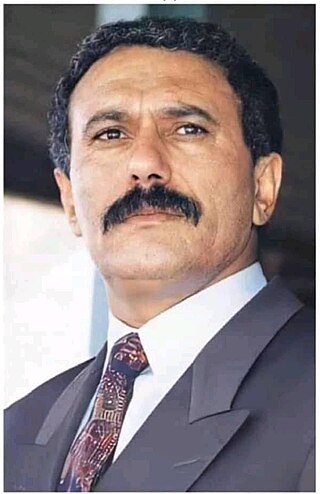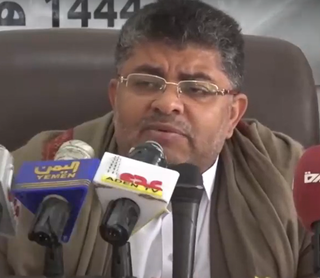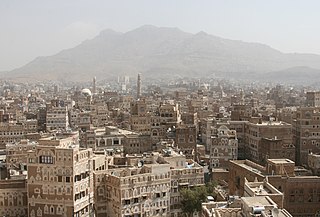Related Research Articles

Ali Abdullah Saleh al-Ahmar was a Yemeni politician who served as the first President of the Republic of Yemen, from Yemeni unification on 22 May 1990, to his resignation on 27 February 2012, following the Yemeni Revolution. Previously, he had served as President of the Yemen Arab Republic, or North Yemen, from July 1978, to 22 May 1990, after the assassination of President Ahmad al-Ghashmi. al-Ghashmi had earlier appointed Saleh as military governor in Taiz.

The Yemeni Socialist Party is a political party in Yemen. A successor of Yemen's National Liberation Front, it was the ruling party in South Yemen until Yemeni unification in 1990. Originally Marxist–Leninist, the party has gradually evolved into a social democratic opposition party in today's unified Yemen.

The Houthi insurgency, also known as the Houthi rebellion, the Sa'dah War, or the Sa'dah conflict, was a military rebellion pitting Zaidi Shia Houthis against the Yemeni military that began in Northern Yemen and has since escalated into a full-scale civil war. The conflict was sparked in 2004 by the government's attempt to arrest Hussein Badreddin al-Houthi, a Zaidi religious leader of the Houthis and a former parliamentarian on whose head the government had placed a $55,000 bounty.

The Houthi movement, officially known as Ansar Allah, is a Shia Islamist political and military organization that emerged from Yemen in the 1990s. It is predominantly made up of Zaidi Shias, with their namesake leadership being drawn largely from the Houthi tribe.

Abdrabbuh Mansur Hadi is a Yemeni politician and former field marshal of the Yemeni Armed Forces who served as the president of Yemen from 2012 until 2022, when he stepped down and transferred executive authority to the Presidential Leadership Council, with Rashad al-Alimi as its chairman. He was the vice president to Ali Abdullah Saleh from 1994 to 2012.

The Yemeni revolution followed the initial stages of the Tunisian Revolution and occurred simultaneously with the 2011 Egyptian revolution and other Arab Spring protests in the Middle East and North Africa. In its early phase, protests in Yemen were initially against unemployment, economic conditions and corruption, as well as against the government's proposals to modify Yemen's constitution. The protesters' demands then escalated to calls for the resignation of Yemeni President Ali Abdullah Saleh. Mass defections from the military, as well as from Saleh's government, effectively rendered much of the country outside of the government's control, and protesters vowed to defy its authority.

The Yemeni Congregation for Reform, frequently called al-Islah, is a Yemeni Sunni Islamist movement established in 1990 by Abdullah ibn Husayn al-Ahmar, Ali Mohsen al-Ahmar, Abdul Majeed al-Zindani, with Ali Saleh's blessing. The first article of Islah basic law defines it as "a popular political organization that seeks reform of all aspects of life on the basis of Islamic principles and teachings".

The siege of Dammaj began in October 2011 when the Houthis, a Zaydi-led rebel group which controls the Sa'dah Governorate, accused Salafis loyal to the Yemeni government of smuggling weapons into their religious center in the town of Dammaj and demanded they hand over their weapons and military posts in the town. As the Salafis refused, Houthi rebels responded by imposing a siege on Dammaj, closing the main entrances leading to the town. The town was controlled by the Houthis and the fighting was mainly centered at Dar al-Hadith religious school, which was operated by Salafis.

Yemeni peace process refers to the proposals and negotiations to pacify the Yemeni Crisis by arranging a power transfer scheme within the country and later cease-fire attempts within the raging civil war. While initially unsuccessful, the reconciliation efforts resulted with presidential elections, held in Yemen in February 2012. The violence in Yemen, however, continued during the elections and after, culminating in Houthi seizure of power and the ensuing civil war.

The National Dialogue Conference (NDC) was a transitional dialogue process held at the Movenpick Hotel in Sanaa, Yemen from March 18, 2013 to January 24, 2014, as part of the Yemeni crisis reconciliation efforts.

The Houthi takeover in Yemen, also known as the September 21 Revolution, or 2014–15 coup d'état, was a popular revolution against Yemeni President Abdrabbuh Mansur Hadi led by the Houthis and their supporters that pushed the Yemeni government from power. It had origins in Houthi-led protests that began the previous month, and escalated when the Houthis stormed the Yemeni capital Sanaa on 21 September 2014, causing the resignation of Prime Minister Mohammed Basindawa, and later the resignation of President Abdrabbuh Mansur Hadi and his ministers on 22 January 2015 after Houthi forces seized the presidential palace, residence, and key military installations, and the formation of a ruling council by Houthi militants on 6 February 2015.

Mohammed Ali al-Houthi is a Yemeni political figure who is the former President of the Revolutionary Committee or Revolutionary Council, a body formed by Houthi militants and the de facto President of Yemen. He was one of the military field commanders who led the group's seizure of the Yemeni capital Sana’a in September 2014, and eventually became the de facto leader of Yemen after the Houthi takeover of the Yemeni government in 2015. He is a cousin of Abdul-Malik Badreddin al-Houthi, the group's leader.

The Yemeni crisis began with the 2011–2012 revolution against President Abdullah Saleh, who had led Yemen for 33 years. After Saleh left office in early 2012 as part of a mediated agreement between the Yemeni government and opposition groups, the government led by Saleh's former vice president, Abdrabbuh Mansur Hadi, struggled to unite the fractious political landscape of the country and fend off threats both from Al-Qaeda in the Arabian Peninsula and from Houthi militants that had been waging a protracted insurgency in the north for years.

The Battle of Sanaa in 2014 marked the advance of the Houthis into Sanaa, the capital of Yemen, and heralded the beginning of the armed takeover of the government that unfolded over the following months. Fighting began on 9 September 2014, when pro-Houthi protesters under the command of Abdul-Malik al-Houthi marched on the cabinet office and were fired upon by security forces, leaving seven dead. The clashes escalated on 18 September, when 40 were killed in an armed confrontation between the Houthis led by military commander Mohammed Ali al-Houthi and supporters of the Sunni hardliner Islah Party when the Houthis tried to seize Yemen TV, and 19 September, with more than 60 killed in clashes between Houthi fighters and the military and police in northern Sanaa. By 21 September, the Houthis captured the government headquarters, marking the fall of Sanaa.

The aftermath of the Houthi takeover in Yemen refers to developments following the Houthis' takeover of the Yemeni capital of Sana'a and dissolution of the government, which eventually led to a civil war and the Saudi Arabian-led intervention in Yemen.

The Yemeni civil war is an ongoing multilateral civil war that began in late 2014 mainly between the Rashad al-Alimi-led Presidential Leadership Council and the Mahdi al-Mashat-led Supreme Political Council, along with their supporters and allies. Both claim to constitute the official government of Yemen.

On 26 March 2015, Saudi Arabia, leading a coalition of nine countries from West Asia and North Africa, launched an intervention in Yemen at the request of Yemeni president Abdrabbuh Mansur Hadi, who had been ousted from the capital, Sanaa, in September 2014 by Houthi insurgents during the Yemeni Civil War. Efforts by the United Nations to facilitate a power sharing arrangement under a new transitional government collapsed, leading to escalating conflict between government forces, Houthi rebels, and other armed groups, which culminated in Hadi fleeing to Saudi Arabia shortly before it began military operations in the country.
The following is a timeline of the Yemeni civil war, which began in September 2014.

The siege of Al Hudaydah, codenamed Operation Golden Victory, was a major Saudi-led coalition assault on the port city of Al Hudaydah in Yemen. It was spearheaded by the United Arab Emirates and Saudi Arabia and has been considered as the largest battle since the start of Saudi Arabian-led intervention in Yemen in 2015.
References
- ↑ Yemen president warns of civil war, US concerned, Dawn , 22 March 2011
- ↑ Yemen: Thousands protest in "Day of Rage", Global Post , 2 February 2011
- ↑ "Yemen's Houthi rebels announce government takeover". Al Jazeera. 6 February 2015. Retrieved 6 February 2015.